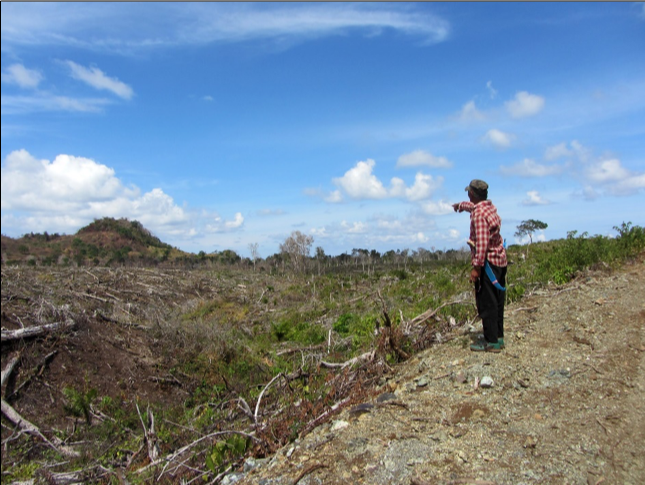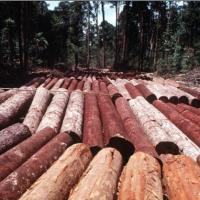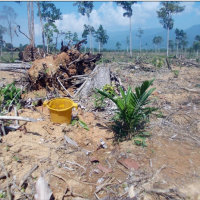First published on 09/25/2016, and last updated on 09/17/2020
By: Dario Novellino, Coalition against Land Grabbing (CALG), ICCA Consortium member
Of all the large-scale mono-crop plantations, oil palms have had the most massive and disastrous impact on ICCAs and commons’ lands in Southeast Asia. Now this devastating trend is expanding globally. Most distressingly, it now threatens the Philippines’ ‘last ecological frontier’ (see recent CALG report). It is no exaggeration to claim that the oil palm industry is currently the single biggest threat to the world’s rain forests and to the remaining ICCAs in Southeast Asia. This threat has expanded to other parts of the world, especially Latin America and Africa, where the Malaysian/Indonesian experience might be tragically repeated. Often, the pattern has been the same: as timber stocks become depleted, the loggers move into the oil palm business, giving no chance for natural forests to regenerate. We see a clear example in Sabah, the eastern-most state in Malaysia, where once-intact ICCAs traditionally managed by Dusun and Murut indigenous people have been mercilessly devastated, with 52 percent of Sabah’s lowland forests now cleared and 29 percent logged. Only 18 percent of the state’s lowland forests remain intact, according to a recent study. This trend is playing out in Sarawak and Kalimantan, too, where Borneo’s forest is being destroyed at twice the rate of the rest of the world’s rainforests, with oil palm plantations playing a heavy role in the plundering of unique biodiversity hot spots and ICCAs.
The Coalition against Land Grabbing (CALG), a Filipino grassroots organization largely composed of indigenous people, is on the frontlines against oil palm expansion in the province of Palawan and in the Philippines as a whole. We, along with some of our international partners such as Rainforest Rescue, are not asking the oil palm companies and their lobbies merely to mitigate the impact of their oil plantations. Instead, we are calling them and selected local governments, to stop any further expansion of oil palm plantations worldwide and to halt the production and import of palm oil conclusively. This issue needs to be raised and seriously addressed when participants at the forthcoming IUCN 2016 World Conservation Congress confront the ambiguous and somewhat misleading language included in the motion on ‘mitigating the impact of oil palm expansion’.
We at CALG are very sceptical about the palm oil sector’s proposal as a model of economic growth with its promise to liberate farmers from indebtedness and patron-client relationship, and to protect them from the risks and fluctuations of the global market. As a rule, we at CALG are against all forms of food production that contribute to climate change and to the privatization of natural resources by large corporations. We are also convinced that large-scale plantations exacerbate the global food crisis. Instead, we strongly support sustainable peasant and indigenous agriculture rooted in local economies and built on local culture and traditions, within the context of the territories and areas conserved by indigenous peoples and local communities (ICCAs). Clearly, we never support the appropriation of natural resources when they are taken away from traditional users and put under the control of large corporations. This practice destroys traditions, cultures, and food sustainability, and it comes at an untenable cost to the environment.
Overall, palm oil production is a dangerous business. It is essential to bear in mind the following elements when considering its future in the increasingly fragile world in which we live:
Sustainable development and oil palm plantations: an impossible match
It is false and dangerous to believe that the industry can contribute to socio-economic development. From the perspective of the victims, this statement is offensive and misleading. Oil palm plantations have displaced thousands of indigenous peoples around the world, destroying their ICCAs and depriving them of their food sovereignty, livelihood and cultural integrity. Palm oil production has increased rural poverty and forced thousands of farmers to work under miserable and exploitative conditions. There is evidence of child labour in oil palm plantations, and governments have pushed oil palm plantations onto land conveniently defined as ‘degraded’, ‘idle’ or ‘abandoned’, when in fact that land is under rotating cultivation fallow periods. Such land is actually thoughtfully cultivated through sustainable rotational cycles by indigenous people- and is not ‘degraded’ at all.
The health hazards of processed palm oil
Palm oil demand will decrease as consumer awareness grows, because palm oil consumption has serious consequences for human health. The European Food Safety Authority (EFSA) assessed the risks of palm oil on public health, focusing on the substances glycidyl fatty acid esters (GE), 3-monochloropropanediol (3-MCPD), and 2-monochloropropanediol (2-MCPD), which are formed when vegetable oils are refined at high temperatures (approx. 200°C). Glycerol-based process contaminants have also been found in palm oil. Dr Helle Knutsen, Chair of the CONTAM Panel (Panel on Contaminants in the Food Chain), said: “There is sufficient evidence that glycidol is genotoxic and carcinogenic, therefore the CONTAM Panel did not set a safe level for GE.” Palm oil also has a relatively high content of saturated fatty acids (SFAs), particularly palmitic acid, which have been associated with increased risk of coronary heart disease and some types of tumors. Vitamins and carotenoid are present in crude palm oil, but these substances are lost in the refining process. Children are especially vulnerable to the harmful effects of palm oil because of their low body weight in relation to the quantity of palm oil-based substances they consume. The German Federal Institute for Risk Assessment (BfR) has issued a warning against consumption of palm oil, and the link between the consumption of palm oil and obesity in children has been stressed by various experts.
As a consequence of ongoing actions at different levels ( especially in Europe) to request food and other industries to give up the use of palm oil, several manufacturing industries are already moving away from the use of palm oil in their products (snacks, biscuits, etc.). Palm oil is not only the world’s most used vegetable oil, but it is increasingly used as an agro-fuel. In Italy, a Conference has addressed a motion against palm oil’s use to the Italian Chamber of Deputies (Motion 066 – Mitigating the impacts of oil palm expansion and operations on biodiversity). While consumers can be informed and asked to purchase palm oil-free food products, it is impossible to provide them with suitable alternatives to the diesel they use for their cars. Diesel fuel contains palm oil.
RSP certifications: “green-washing” becomes legalized
It is doubtful that there is any sustainable approach to oil palm cultivation. CALG believes that what is envisioned by the Roundtable on Sustainable Palm Oil (RSPO) is simply a form of “green-washing”. As RSPO’s criteria for sustainability are based on assumptions that cannot be proven, we believe the way forward is simply to shift to sustainable alternatives to oil palm development. We believe that those who support the RSPO are endorsing a harmful business, one proven to be socially and environmentally unsustainable in the majority of countries where oil palm plantations have been established. Certification schemes for industrial tree plantations are often an illusion or an instrument for corporations to distract from the real problems and their disastrous effects on human lives and on the environment. As argued by Rainforest Rescue: “The RSPO does not rule out the clearing of rainforest. Only primary and ‘high conservation value’ (HCV) forests have been considered off-limits for palm oil plantations under RSVP label, since November 2005. An internationally recognized definition of HCV areas has not been established, and the transitions between primary and secondary rainforests are blurred in practice. Most of the social aspects that have been defined by the RSPO are general principles and human rights, the compliance with which should be self-evident. Despite of RSVP certification, farmers and indigenous people are displaced from their lands, and they are threatened or arrested if they resist the land grabs. Compliance with the criteria is not reviewed adequately, and violations are rarely punished”.
Respect of ILO 169 could reduce oil palm expansion on tribal land
The ILO 169 Convention could play a key role in saving the world’s rainforests, and help put control of the land back in the hands of the people who have looked after it for generations. The Convention on Biological Diversity (CBD) Strategic Plan for Biodiversity 2011–2020 and its the Aichi Targets, and the United Nations 2030 Agenda for Sustainable Development with its 17 Sustainable Development Goals (SDGs) could also help. ILO 169 includes international commitments for the rights of indigenous peoples. While UNDRIP is not legally binding for the ratifying countries, ILO Convention 169 is. Policies and investments in agriculture and land use have a direct impact on indigenous peoples, and biofuel and investments in the oil palm industries should reviewed with those consequences in mind. We also need to convince the nations who have sidestepped signing ILO 169 that it is a crucial document and worthy of their adoption. (For more details, please check this link: a report by Rainforest Rescue.)
The World Conservation Congress: a call for action for IUCN Director General
As we prepare for the IUCN 2016 World Conservation Congress, we believe that strong and immediate measures are needed. In view of the catastrophic impact palm-oil plantations have already had on tropical forests, we must urge the IUCN Director General to do more than merely conduct a situation analysis. A great deal of powerful evidence about the impact of oil palm plantations on biodiversity and local communities already exists and is readily available. Rather, we believe that the DG should make an uncompromising call to halt oil palm expansion globally. She should urge the European Union and individual countries to abandon their disastrous biofuels policies for the benefit of climate, biodiversity, and the health and well-being of millions of peoples from the global south. According to Rainforest Rescue, tropical forests are going up in flames because of the EU’s tragically misguided efforts to protect the climate with its biofuels policy. Producing the 1.6 million tons of palm oil consumed annually by European vehicles requires a plantation area of 5,500 square kilometres – that’s an area of former rainforest land nearly four times the size of London or seven times the size of New York City. The IUCN DG should urge member countries to reduce immediately, and finally ban, the importation of palm oil. Prompt and decisive action is the only way to save the dwindling tropical forest that remains, especially in countries where ICCAs exist and represent the most vivid, vibrant and successful examples of how indigenous and traditional communities are the best managers and protectors of their natural environment and cultural landscapes.
- Clear cutting for oil palm expansion in Riau, Sumatra © D. Novellino
- Forest clearing for oil palm plantations in Bataraza, Palawan © D Novellino
- Virgin forest being converted into oil palm plantations in Sarawak © D. Novellino



